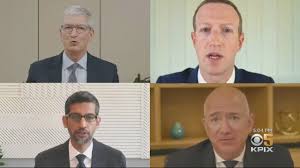The CEOs of Google, Facebook, Amazon, and Apple all fronted the House Judiciary Committee in the US today as part of a five-hour hearing which intended to establish whether the tech giants have been operating in an anti-competitive manner.
The subsequent rulings based on the hearings could, eventually, result in new regulations restricting, or even reducing, the market dominance of each.
As has become normal in such hearings, some questions related to how the tech companies operate in other respects, and several questions appeared to miss the point. But there were also some tough queries for the CEOs to answer, including:
- Google’s Sundar Pichai was asked about Google’s practices in relation to scraping reviews from other platforms, which have reduced traffic to platforms like Yelp
- Facebook CEO Mark Zuckerberg was questioned about Facebook’s acquisition of Instagram, which, documents suggest, was at least partly intended to ‘neutralize’ a competitor
- Amazon CEO Jeff Bezos was called upon to explain his company’s undercutting of competitor prices, using the case of diapers.com. Amazon reportedly sold diapers at a loss of an estimated $33 million per month in order to push diapers.com out of business
- Apple’s Tim Cook was questioned about Apple’s commission rates and its decisions to restrict apps when Apple had released competing tools and features
All of these questions, backed with fairly clear evidence, support the core case that these larger corporations, due to their size, and now able to quash competition, while questions were also raised around how the platforms use their massive scale to promote their own products, essentially establishing a field of play, and then competing in the same, though under significantly different rules.
Most of these decisions make sense from a business standpoint, and in isolation, you can see why the tech platforms have operated in this way. But they do appear to be anti-competitive, and they do indeed raise significant questions over whether the platforms should face tougher regulation, or be broken up.
As noted by House Judiciary Antitrust, Commercial and Administrative Law Subcommittee Chair David Cicilline (D-RI) in his close remarks:
“This hearing has made one fact clear to me: these companies as they exist today have monopoly power. Some need to be broken up, all need to be properly regulated and held accountable. We need to ensure the antitrust laws first written more than a century ago work in the digital age.”
That, really, is what’s at the core of this investigation, whether the existing laws are as applicable as they could be in the current, digital age. That also applies to copyright regulations and content ownership provisions. Many of these laws were written in a time of physical media, or publisher-controlled broadcasting. The digital landscape has changed everything in this respect, and is still changing every day – and as such, it’s important that the laws reflect the current state of the market and elements like anti-competitive activity.
The question now is what comes next? There does seem to be enough evidence to prompt further examination, but a resultant change in regulations could still take some time if the House is able to agree on the right approach moving forward.
As such, it’s difficult to take too much away from the session, which did raise some critical questions that the CEOs, as noted, could not adequately answer.
From a digital marketing perspective, and change to the tech platforms would obviously have significant impacts on the broader market, but as yet, we’re still in the early stages, and we don’t know what might come of the investigation.
We’ll keep you updated on any progress.

Looking forward to your next post!
The examples really helped.
It was a pleasure reading this.
Truly a masterpiece of content.
Well explained and easy to follow.
Good post! We will be linking to this particularly great post on our site. Keep up the great writing
It was a pleasure reading this.
Great effort, well appreciated.
Clear, concise, and effective.
Super insightful and fresh perspective.